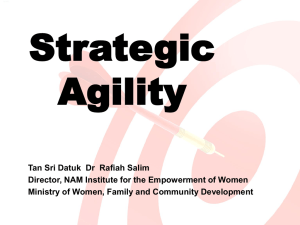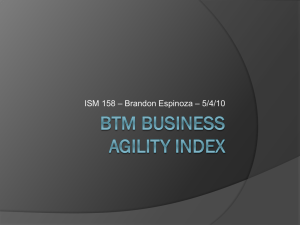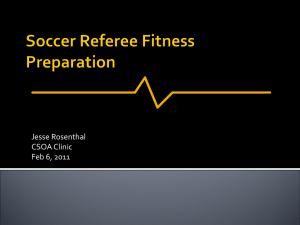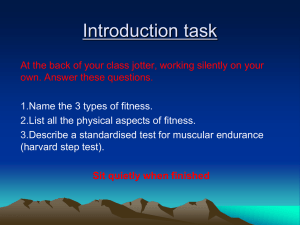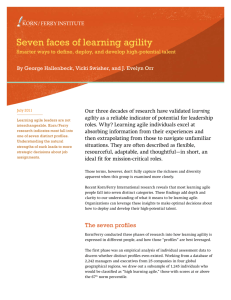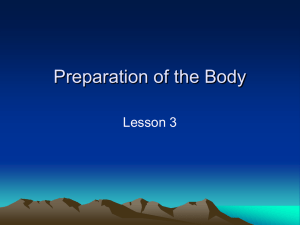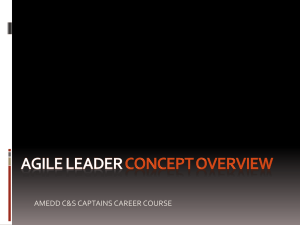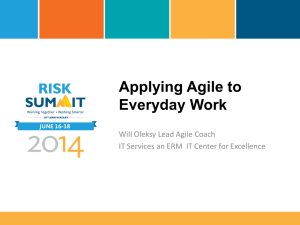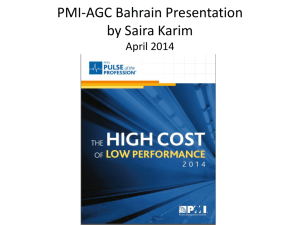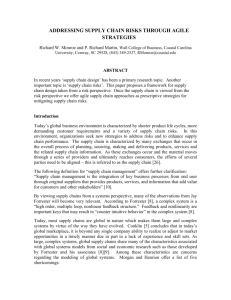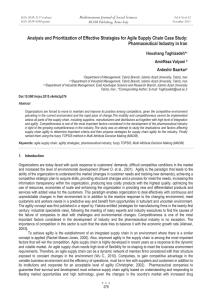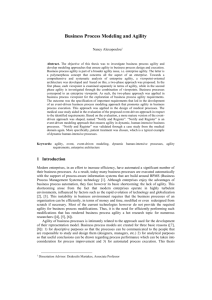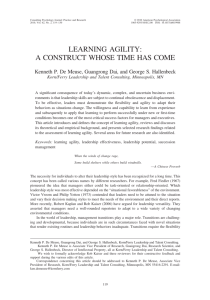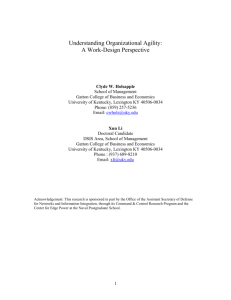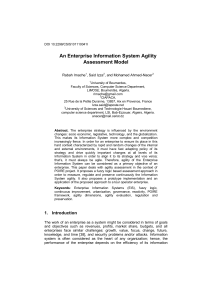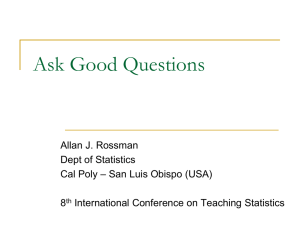Transforming to an Agile Organization
advertisement
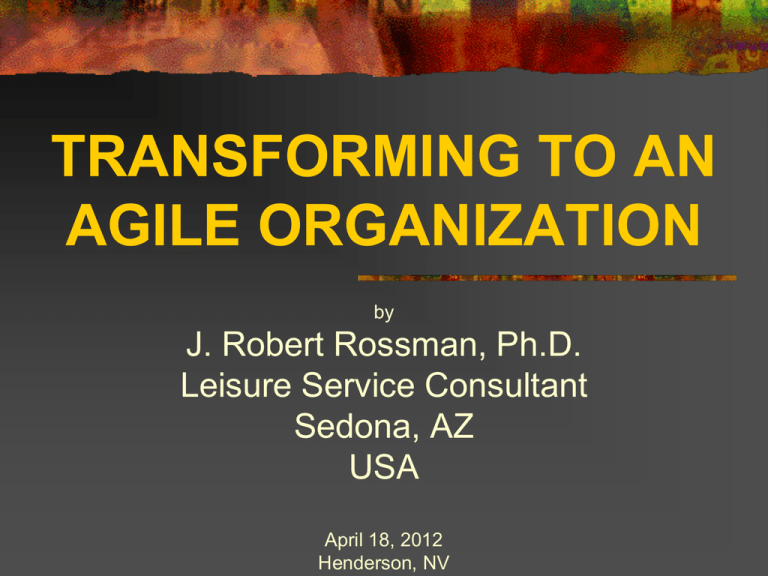
TRANSFORMING TO AN AGILE ORGANIZATION by J. Robert Rossman, Ph.D. Leisure Service Consultant Sedona, AZ USA April 18, 2012 Henderson, NV Recommendations from an OPEN FORUM NRPA Congress Nov. 3, 2011 Atlanta, GA Published in a White Paper, The Agile Organization; Transforming Your Agency to Survive and Thrive in Any Economy, by J. Robert Rossman, Ph.D., © 2012 NRPA DATA GATHERNG The Forum began with presentations by three professionals about a variety of processes used in the past few years to remain agile. Round table discussions (average of 8 per table) with a Table Facilitator. Discussions were guided by an interview schedule developed by Dr. Rossman. Table Facilitators were volunteers from the American Academy for Park and Recreation Administration. Sixty-five (65) conference attendees from across the country participated in the Forum. A PROBLEM—Constant and Dramatic Change Due to Economic Uncertainty. ECONOMIC RECESSION REDUCTION IN TAX SUPPORT AT THE LOCAL, STATE, AND FEDERAL LEVELS Can you really do more with less? Or, is less, less? WHAT IS ORGANIZATIONAL AGILITY? The capability of an organization to rapidly change or adapt in response to changes in their environment. Rapid change means more often than a normal cycle would require, i.e. asynchronous cycle changes. WHAT CAN AN AGILE ORGANIZATION ACCOMPLISH? EFFICIENT REPONSE TO RAPID CHANGE Adaptable strategies and goals. Flexibility to allocate and reallocate all resources. Performance agility; the ability to do it differently quickly. WHAT MANAGEMENT PRINCIPLES ARE CHALLENGED BY THE NEED FOR AGILITY? Regularity of performance (both environmental and organizational stability) Goal theory Cyclical decision making QUESTIONS ASKED at the OPEN FORUM Have agencies really needed to become more agile? What strategies have been used to implement agility? How has planning been effected by the need to demonstrate more agility? THE NEED FOR AGILITY IS REAL 67% of the agencies reported they had to develop new operational strategies during the past year. 59% of the agencies reported that these new strategies had to be developed rapidly; outside of normal budget or strategic planning cycles. WHAT AGILITY STRATEGIES WERE USED? 59% of the agencies reported they had developed NEW COMMUNITY PARTNERSHIPS during the past year. Of the remaining agencies, 92% believed partnerships were a good strategy to deal with the economic downturn. WHAT AGILITY STRATEGIES WERE USED? Other Use strategies reported: of INNOVATIVE BUSINESS MODELS Development of UNCONVENTIONAL FUNDING SOURCES A potpourri of OTHER STRATEGIES THE PARTNERSHIP STRATEGY Comparative Use of Partnership Agreements (Ranked by Frequency) Type of Partner N of Respondents out of 63 % of Respondents Other (excluding the YMCA) Youth Serving NFPs Local School Organization 44 70% 40 64% Nature or Environmental Group Health-Care Provider Private Corporation YMCA 27 43% 26 41% 26 41% 12 19% DESIRABILITY OF PARTNERS Desirability of Partnering with Specified Groups* Type of Partner % of Respondents Nature or Environmental Groups 81% Local School Organization 70% Health-Care Provider 57% Private Corporation 47% Youth Serving NFPs excluding YMCAs 24% *From agencies who did not have this type of partnership. PARTNER PROFILES School Districts POSITIVES Valued assets schools possess—facilities, transportation equipment and networks Major effort at joint use and development of athletic facilities. Joint programming— before and after school, environmental education, and recycling programs CHALLENGES School’s own financial struggles Lack of historical involvement Often schools do not really need park’s assets Problems determining economic value of exchanged services/goods PARTNER PROFILES YMCA The YMCA was NOT the primary partner in the not-for-profit category. The YMCA was viewed in many communities as a major competitor of the municipal operation who offered programs to a different profile demographic. Yet, some communities had very successful relationships with Ys. PARTNER PROFILES Not-for-profit Agencies Partnering with local youth sport organizations, many of whom were organized under Section 503 c of the IRS Code, was a major area of partnership involvement. Joint programs, facility development and leasing. PARTNER PROFILES Not-for-profit Agencies Partnering with nature and environmental groups was a major area of partnering activity. Enhances the park and recreation agency’s position as a Green organization. Provides a corps of volunteers to help with clean up of parks, streams, etc. Engenders positive social networks that lead to helpful political action, grants, and educational programs and events. PARTNER PROFILES Health Care Providers A relatively new, highly desired strategy that positions the park and recreation agency as part of the wellness movement. POSITIVES Serving constituent needs—wellness activities, serve disabled populations, rehabilitation activities. Most frequently reported activities--wellness and health screenings CHALLENGES Lack of agency capacity to provide documentation notes about client progress/performance. Lack of agency capacity to provide data about the efficacy of programs. PARTNER PROFILES Private Corporations The greatest variety of partnering agreements of any category. Naming rights? Sponsorship of major events Gifts for specific outcomes Donation of corporate expertise PARTNER PROFILES Sustaining Partnerships There are many potential issues in developing and sustaining partnerships. Time consuming and laborious to negotiate. Economic downturn has cause discontinuation or renegotiation of existing partnerships. Competing with other organizations who are now also seeking partners. ++Renewed interest has lead to new partners with $$$ including law enforcement, health departments, and transportation departments. UNCOVENTIONAL FUNDING SOURCES Expanding advertising sales. Sponsorships—discovered the value of selling exclusivity Revenue producing niche programming Service Sharing with other agencies A potpourri of other strategies INNOVATIVE BUSINESS PRACTICES Redefining mission and core services to fit resources. Revisiting fee and cost recovery policies and practices. Reorganization for efficiency or to reduce the work force. +Implementation of entrepreneurial approaches-Cost Shifting & ROI ORGANIZATIONAL AGILTY AND PLANNING 46% of participants in the Open Forum responded to questions regarding planning practices in their agency (n = 46). HOW LONG IS A LONG RANGE PLAN? ORGANIZATIONAL AGILTY AND PLANNING SHORTER PLANNING TIME FRAMES Duration of long-range plans Number of Years Number of Agencies % of Agencies 3 13 28.3% 5 19 41.3% 10 8 17.4% Some other number 4 8.7% No answer 2 4.3% 57% USED A ROLLING PLAN— 5 YEARS WAS THE MODAL DURATION QUESTIONS ANSWERED at the OPEN FORUM Have agencies really needed to become more agile? YES What strategies have been used to implement agility? PARTNERTSHIPS + How has planning been effected by the need to demonstrate more agility? SHORTER PLANNING PERIODS SELF-ASSESSMENT OF YOUR ORGANIZATION'S AGILITY COMPLETE THE INSTRUMENT SCORING Characteristic Enter the total number of entries for each category X 3 = Somewhat Characteristic X 2 = Not Characteristic X 1 = Sum your results RESULTS An Agile Organization Good Agility, Some Areas To Improve Many Areas To Develop Agility 30--36 35--24 23--12 FINDINGS, CONCLUSIONS, and REOMMENDATIONS Develop organizational capacity for continuing agility throughout the year Re-examine mission when faced with a dramatic reduction of resources Develop sustainable partnerships to help implement the agency’s mission Build in termination and adjustment clauses in all new and existing partnerships FINDINGS, CONCLUSIONS, and REOMMENDATIONS Before developing partnerships Develop good background Have definite outcomes you hope to achieve Historically sound partners—not-for-profits and schools New partnerships—health care organizations, nature and environmental groups, and selected appropriate private corporations FINDINGS, CONCLUSIONS, and REOMMENDATIONS Business practices Redefining core services Rewriting cost recovery policies Reorganization for efficiency and workforce reduction Unconventional funding sources Seeking new advertisers Promoting exclusivity Revenue producing niche programs Bartering services FINDINGS, CONCLUSIONS, and REOMMENDATIONS Scan your environment for partners with sound funding Health care organizations Law enforcement agencies Transportation departments QUESTIONS and DISCUSSION TRANSFORMING TO AN AGILE ORGANIZATION by J. Robert Rossman, Ph.D. Leisure Service Consultant Sedona, AZ

